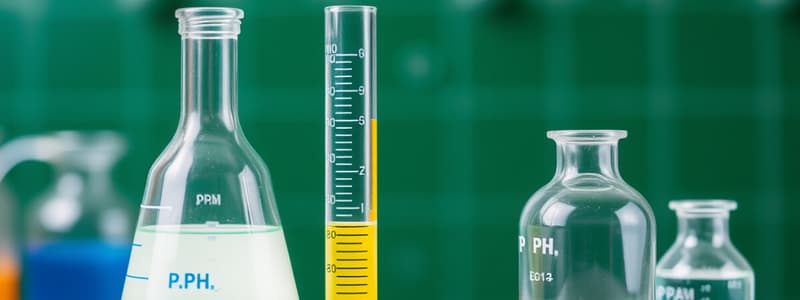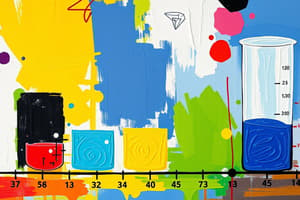Podcast
Questions and Answers
What is an acid?
What is an acid?
An acid is an aqueous solution that has H+ ions. The more H+ ions, the more acidic the solution.
Which of the following properties is associated with acids?
Which of the following properties is associated with acids?
- Feels slippery
- Turns red litmus paper blue
- Turns blue litmus paper red (correct)
- Tastes sour (correct)
Which of the following is a common acid?
Which of the following is a common acid?
- Calcium hydroxide
- Ammonia
- Sodium hydroxide
- Hydrochloric acid (correct)
What is a base?
What is a base?
Which of the following properties is associated with bases?
Which of the following properties is associated with bases?
What does the pH scale measure?
What does the pH scale measure?
What is the pH of a neutral solution?
What is the pH of a neutral solution?
What does the formula pH + pOH equal?
What does the formula pH + pOH equal?
How do you calculate pH from the concentration of hydrogen ions?
How do you calculate pH from the concentration of hydrogen ions?
If a solution has a concentration of hydrogen ions of 0.01M, what is its pH?
If a solution has a concentration of hydrogen ions of 0.01M, what is its pH?
The more H+ ions, the more _____ the solution.
The more H+ ions, the more _____ the solution.
Flashcards
What is the pH scale?
What is the pH scale?
Measures acidity/basicity; range 0-14. 7 is neutral.
What determines pH?
What determines pH?
Determined by [H+]. Higher [H+] = more acidic.
How do [H+] and [OH-] relate?
How do [H+] and [OH-] relate?
[H+] > [OH-] (acidic), [OH-] > [H+] (basic), [H+] = [OH-] (neutral).
Acids vs. Bases: Ions
Acids vs. Bases: Ions
Signup and view all the flashcards
What are acids (definition)?
What are acids (definition)?
Signup and view all the flashcards
What are acid properties?
What are acid properties?
Signup and view all the flashcards
What are bases (definition)?
What are bases (definition)?
Signup and view all the flashcards
What are base properties?
What are base properties?
Signup and view all the flashcards
pH calculation formula
pH calculation formula
Signup and view all the flashcards
pOH calculation formula
pOH calculation formula
Signup and view all the flashcards
pH and pOH relationship
pH and pOH relationship
Signup and view all the flashcards
Study Notes
pH Scale Overview
- pH scale measures acidity and basicity, ranging from 0 to 14.
- Acidic solutions have a pH below 7, neutral solutions at pH 7 (pure water), and basic solutions above pH 7.
Hydrogen Ion Concentration
- pH is determined by the concentration of hydrogen ions [H+].
- Higher [H+] indicates a more acidic solution.
- Logarithmic scale: each unit decrease in pH represents a tenfold increase in [H+].
Hydroxide Ion Concentration
- Bases are characterized by the presence of hydroxide ions [OH-].
- For acids: [H+] > [OH-]; for bases: [OH-] > [H+].
- When [H+] = [OH-], the solution is neutral.
Acidity and Basicity
- Acidic solutions yield more H+ ions in solution.
- Basic solutions yield more OH- ions in solution.
- Relationship between pH and pOH: pH + pOH = 14.
Definition of Acids
- Aqueous solutions that contain H+ ions.
- Stronger acidity corresponds to a higher concentration of H+.
- Common acids include HCl, HNO3, vinegar, and citric fruits.
Properties of Acids
- Sour taste and corrosive nature.
- Turns blue litmus paper red.
Definition of Bases
- Aqueous solutions that contain OH- ions; also called alkaline.
- Common bases include NaOH, Ca(OH)2.
Properties of Bases
- Bitter taste, slippery feel, and corrosive.
- Turns red litmus paper blue.
Calculating pH
- Formula: pH = -log[H+].
- Example: 0.01M HCl has a pH of 2 because [H+] = 0.01M or 10^-2.
Calculating pOH
- Formula: pOH = -log[OH-].
- Relationship: pH + pOH = 14.
- Example: For 0.01M NaOH, pOH is 2, thus pH = 12.
Quick pH Calculation Trick
- Use 10^-x where x equals pH for acids; 10^-x where x equals pOH for bases.
- For 0.001M solutions, the pH or pOH corresponds directly to the exponent.
Relationships Between pH, pOH, and Ion Concentrations
- If pH = 4, then [H+] = 1 x 10^-4 M; corresponding calculations yield pOH = 10 and [OH-] = 1 x 10^-10 M.
- For given [OH-], how to find pH: convert [OH-] to pOH, then calculate pH as pH = 14 - pOH.
Advanced Calculation Examples
- Given [H+] = 1 x 10^-10 M, then pH = 10.0.
- Given [OH-] = 1.80 x 10^-5 M, calculate pOH and then derive pH.
These notes provide a comprehensive understanding of acids, bases, and the pH scale, essential for chemistry studies.
Studying That Suits You
Use AI to generate personalized quizzes and flashcards to suit your learning preferences.




